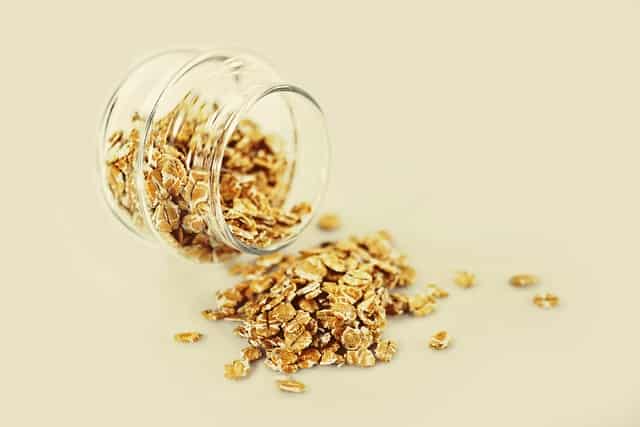Organic oat milk has quickly become a popular alternative to dairy, and it’s easy to see why. Creamy, smooth, and subtly sweet, this plant-based milk is perfect for anyone looking to cut back on dairy without sacrificing taste. So, what exactly is organic oat milk, and why is it the perfect dairy-free alternative? Let’s dive in and explore the many benefits of this nutritious beverage.
What is organic oat milk?
Organic oat milk is a plant-based, dairy-free substitute to conventional cow’s milk. It is made from whole oats that have been soaked, blended, and strained to create a creamy and nutritious beverage. Organic oat milk, in contrast to other dairy-free substitutes, is made without the application of synthetic pesticides, fertilizers, or genetically modified organisms (GMOs).
For individuals wishing to cut back on their intake of animal products, this makes it a healthier and more ecologically friendly choice.
Organic vs. Conventional Oat Milk
While conventional oat milk is still a great option for those avoiding dairy, organic oat milk has the added benefit of being produced without harmful chemicals. This ensures a cleaner product, and it’s often considered a more sustainable option since organic farming practices tend to be more environmentally friendly.
Why choose oat milk over other dairy-free alternatives?
There are several reasons why organic oat milk is a common alternative among those seeking a dairy-free alternative.
To begin with, it tastes naturally sweet and mild, much like cow’s milk, which makes it a fantastic alternative for people who find other plant-based milk too strong or overwhelming.
Second, the creamy and smooth texture of the milk makes it simple to include in a wide range of recipes, including soups, baked goods, coffee, and smoothies.
Another benefit of oat milk is its nutritional profile. It is a heart-healthy choice for anyone watching their diet of saturated fats because it is naturally low in fat and cholesterol. Oat milk is also a valuable source of fiber that can help in supporting digestive health and enhance feelings of fullness.
Besides, it contains minerals and essential vitamins such as vitamin D, calcium, and iron, which are necessary for healthy bones and general wellbeing.
The nutritional benefits
Oat milk is not just a delicious and versatile dairy-free alternative, but it also offers a range of nutritional benefits. One of the major benefits of organic oat milk is its high fiber content.

Fig. 1: Oat milk has a range of nutritional benefits
Oats are naturally rich in dietary fiber, which can help in regulating blood sugar levels, facilitate healthy digestion, and aid weight management. In addition, fiber has been demonstrated to lower cholesterol levels, which may help minimize the risk of heart disease.
In addition to fiber, the milk contains essential vitamins and minerals. It is often fortified with vitamin D and calcium, which are essential for developing strong teeth and bones.
These nutrients are particularly vital for people who follow a vegan or dairy-free diet, since they could be at a higher risk of deficiency. Oat milk also offers a better source of iron, which is vital for the production of red blood cells as well as the prevention of iron deficiency anemia.
How oat milk is made
Oat milk is made using a simple and natural process. Whole oats are soaked in water, blended to form a smooth consistency, and then strained to remove any solids.
The end product has a texture that is similar to that of regular cow’s milk and is creamy and slightly sweet. The milk can be bought pre-made from several manufacturers, or it can be prepared at home with a blender, water, and organic oats.

Fig. 2: Oats are used to make oat milk
Organic oat milk and sustainability
In terms of sustainability, oat milk is considered a better choice. Unlike conventional dairy farming, which can have a significant impact on the environment, oat milk production is much more resource-efficient and environmentally friendly.
Oats need considerably less water as well as land to cultivate compared to cows used for milk production. Furthermore, organic farming practices do not rely on synthetic pesticides or fertilizers, which can harm the soil and contribute to water pollution.
By choosing oat milk, you are not only making a healthier choice for yourself but also supporting sustainable agricultural practices. The production of oat milk helps lower greenhouse gas emissions, protect water resources, and maintain the biodiversity of our ecosystems.
This is a little change that can have a big impact on the planet.
oat milk and allergies
One of the great benefits of oat milk is that it is naturally free from common allergens such as lactose, nuts, and soy. Because of this, it is an important option for people who have dietary needs or allergies.
Again, oat milk is gluten-free, making it a better option for people with celiac condition or gluten sensitivity.
It’s vital to remember, though, that some people might actually have an oat allergy. It is important to speak with a healthcare provider before ingesting oat milk or any other oat-based products if you have a known oat allergy.
They can assist you in deciding if adding it to your diet is safe.
oat milk recipes and usage ideas
Oat milk is incredibly versatile and can be applied in a broad range of recipes and dishes. Here are some ideas to inspire your culinary creativity:
- Coffee and tea: Use oat milk as a delicious and dairy-free option in your morning cup of coffee or tea.
- Smoothies: Add oat milk to your favorite smoothie recipes for a creamy and nutritious boost.
- Cereal and granola: Pour the milk over your cereal or granola for a wholesome and satisfying breakfast.
- Soups and sauces: Use oat milk as a base for creamy soups and sauces, adding richness and flavor to your dishes.
- Baking: Substitute traditional milk with oat milk in your favorite baked goods to create moist and flavorful treats.
The possibilities are endless, so do not be afraid to get creative and experiment with oat milk in your favorite recipes.
Where to buy oat milk
Oat milk is becoming increasingly popular, and as a result, it is widely available in most grocery stores and health food stores. You can find it in the dairy or plant-based milk section, usually alongside other non-dairy options such as coconut milk, soy milk, and almond milk.
Furthermore, many online merchants provide a large assortment of oat milk brands, making it easy for you to acquire it from the comfort of your house.
Make sure you read the label for any additional ingredients or additives before buying organic oat milk. Certain brands might use thickeners, flavors, or sweeteners, which might change the product’s nutritional value and flavor.
Choose brands that use minimal and natural ingredients to ensure you are getting the purest form of oat milk.
oat milk vs. other dairy-free alternatives
Whereas there are several dairy-free alternatives available on the market, oat milk stands out for several reasons. To start with, it tastes and feels almost exactly like regular cow’s milk, which makes it a more palatable choice for people cutting out dairy.
Additionally, it is more adaptable and can be used in a variety of recipes without substantially changing the dish’s flavor or texture.
From a nutritional standpoint, oat milk provides unique benefits. Its high fiber content can help in regulating blood sugar levels, facilitating healthy digestion, as well as supporting weight management.
Moreover, the milk is a well-rounded option for people trying to meet their nutritional demands without consuming animal products because it has been fortified with essential vitamins and minerals.
Common Myths About Organic Oat Milk
Despite its growing popularity, there are still a few misconceptions about organic oat milk. Let’s debunk them.
Myth: Oat milk isn’t as nutritious as dairy
While oat milk may have less protein than cow’s milk, it’s still packed with essential nutrients like fiber, vitamins, and minerals. Many brands fortify their oat milk with calcium and vitamin D to make it a more balanced option.
Myth: Organic oat milk is always expensive
Although organic products generally cost more, there are affordable options available. Many brands provide the milk at competitive prices, and homemade versions are even more cost-effective.
Conclusion
Oat milk is a delicious, nutritious, and sustainable dairy-free substitute to conventional cow’s milk. Its naturally sweet taste, creamy texture, and nutritional benefits make it a popular choice among those seeking a plant-based option.
Whether you are lactose intolerant, have dietary restrictions, or simply want to reduce your consumption of animal products, oat milk is a versatile and healthy option.
Not only does oat milk provide an array of nutritional benefits, but it also supports sustainable agricultural practices and helps reduce our impact on the environment. By opting for organic oat milk, you can enjoy the texture and taste of conventional milk while making a positive bearing on your health and the planet.
Thus, why not attempt some organic oat milk? Add it to your favorite recipes, sip a glass to revel in its creamy sweetness, or mix it into your daily coffee. Your body and taste senses will all appreciate it.
FAQs
Is organic oat milk healthier than regular oat milk?
Yes, organic oat milk is often considered healthier because it’s made from oats that are free from synthetic pesticides and GMOs, making it a cleaner product.
Can oat milk replace dairy in all recipes?
Oat milk can replace dairy in most recipes, but its slightly sweet flavor might not be ideal for savory dishes. It’s perfect for baking, smoothies, and coffee.
What are the best brands of organic oat milk?
Some of the top brands of organic oat milk include Oatly, Califia Farms, and Planet Oat. Be sure to read labels to choose one that suits your needs.
How long does organic oat milk last?
Once opened, organic oat milk typically lasts 7-10 days in the refrigerator. Always check the expiration date and store it properly to ensure freshness.
Can children drink organic oat milk?
Yes, organic oat milk can be a suitable option for children, especially those with dairy allergies. However, it’s essential to consult a pediatrician to ensure they get adequate nutrition.



Pingback: How to Use Organic Sesame Milk for Weight Loss
Pingback: Difference Between Coconut Milk Powder and Coconut Water...